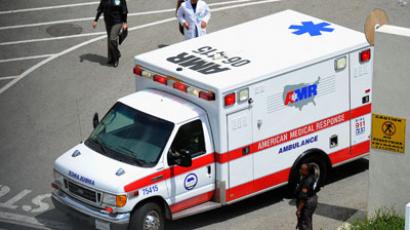Will You Be Charged For Calling 911?
Durand Ford Jr. called 911 at 1:25am on January 1st 2013. Ford Jr. told the Washington D.C. Fire and Emergency Services Station that Ford’s father, Durand Ford Sr., was having problems breathing. At 1:34am, emergency personal arrived – in a fire truck. Unfortunately, the firefighters were not equipped to help a dying 71 year old man, so the Fords and the firefighters waited for an ambulance. The ambulance – from George County – arrived at 1:58am, thirty-three minutes after Ford Jr.’s initial emergency call. Durand Ford Sr. had already died.
A month later though, the D.C. Fire station sent a grieving Ford Jr. a $780.85 bill. Mr. Ford was understandably furious. D.C. Councilwoman Yvette Alexander claims that the station had not charged for similar services in the past. An investigation revealed that there were idle ambulances in the D.C. station on the night Ford Sr. passed away, but the station had lacked the necessary staff to use the ambulances since an unusual number of personal had been on vacation that night.
As cities lose money to recessions, stories about first-responders charging for their services become more common. Indeed the D.C. station had previously been criticized for delaying medical treatment to a 94 year woman with a head injury. Several states have banned first-responders from charging for their services, but most of the country still gives discretion to emergency personal to charge patients and crime victims.
If city governments cannot, or will not, fund police, firefighters, or medical personal, first-responders charging for services is understandable, if frowned upon. Basic economic principles are that materials such as gas, medication, clean-up, and transportation must be paid for. If the cities cannot pay for supplies, the costs will inevitably fall on the party using the supplies. The costs are paid for either indirectly through taxes and insurance, or upfront in a bill, but the costs are always paid. Moreover, although first-responders are extraordinary individuals, they must still support their families.
 Victims, patients, and most of the general public would counter that they pay for their services through taxes and should not be charged double in this manner. More importantly though, first-responders have an obligation to the community, not just to themselves. Charging people who dial 911 for help creates an unnecessary division along social-economic lines. This division can be acceptable when purchasing automobiles, homes, schools, and even food. It is not acceptable in matters of life and death though, such as emergency medical services, because everyone’s life is, or should be, worth the same. It does not matter if the patient is rich or poor, government services should treat all citizens the same.
Victims, patients, and most of the general public would counter that they pay for their services through taxes and should not be charged double in this manner. More importantly though, first-responders have an obligation to the community, not just to themselves. Charging people who dial 911 for help creates an unnecessary division along social-economic lines. This division can be acceptable when purchasing automobiles, homes, schools, and even food. It is not acceptable in matters of life and death though, such as emergency medical services, because everyone’s life is, or should be, worth the same. It does not matter if the patient is rich or poor, government services should treat all citizens the same.
First-responders would balk at the suggestion they choose who lives and who dies by charging, since first-responders, even the ones who expect payment, save lives first and send the bill later. However, if a family cannot afford a large bill and they know they cannot afford such a bill, the government would be creating an incentive not to call. A public policy which discourages people from asking for help, or from help others, is not a good policy.
The Ford story, tragic as it is, does raise an interesting question for cities that permit its first-responders to charge bills. The ambulance failed to arrive in time to save Ford Sr., but what if Mr. Ford had been saved? Would the D.C. station still be justified to sending a bill to Ford Jr.? If the answer is yes, then first-responders would be operating on a contingency fee: they would be paid only if they saved a person’s life. Such a system would help family members feel they are not being further victimized when a bill is sent. On the other hand, a contingency billing system would only add economic pressure to the emotional and social pressure faced by first-responders every time someone calls 911.


Comments